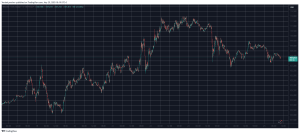Bitcoin Satoshi Vision (BSV) has been taken over by a single miner who is contributing around 80% of the network’s hash rate.
The miner in question has been mining empty transaction blocks, significantly hampering the network and leaving genuine transactions in the lurch. The Bitcoin Association has now called for the miner to be blocked by exchanges and freeze their block rewards.
A Single Miner Takeover
Bitcoin Satoshi Vision (BSV), created by Craig White and touted as the version of bitcoin imagined by Nakamoto, has come under a 51% attack. A single miner is currently responsible for 80% of the chain’s mining hash rate. The takeover of the hash rate gives the miner complete control of the BSV network. So far, the miner in question has accumulated 9000 BSV tokens, valued at around $450,000.
The takeover is puzzling many as before the miner in question came online, the hashrate on the BSV network was fairly constant, save for a spike in June 2022. The hash rate measures the computing power expended to solve a cryptographic puzzle and create new blocks. Now, the network has been bogged down after the miner began mining empty blocks featuring no transactions.
The Empty Block Attack
While the current Bitcoin SV blocks do not contain any transactions, the network’s mempool, which consists of transactions waiting to be included in blocks, is overrun by millions of unprocessed transactions. According to Curriculum Specialist for the Bitcoin Association, Todd Price, this has led to several issues for services in the ecosystem.
“This can cause issues for the various services in the ecosystem as they may not have allocated enough RAM for persisting a mempool of such size.”
Empty block attacks occur when miners choose to process empty blocks, slowing down the network for other users. While miners are well within their rights to mine empty blocks, it does not substantially impact the network’s performance. However, the network could feel the impact if a large enough and centralized majority of hash power orchestrates the attack.
Price added that mining empty blocks violate the “unilateral contract” that users expect miners to uphold. According to Price, the miner is required to broadcast the transaction to all nodes.
“While the contract is not defined in a single text document, there are several pieces which together can be construed as aspects of a contractual relationship. The white paper as the technical manifesto for the Bitcoin protocol is one such component.”
Bitcoin Association Calls For Freeze
The Bitcoin association, on its part, has asked miners and crypto exchanges to block the attacker’s block rewards to stem the barrage of empty blocks unleashed on the network. The association’s call for a freeze on the attacker’s block rewards is to prevent the attacker from cashing out their earnings. Thus, if the attacker continues to mine empty blocks, they will have to pay the cost of mining without reaping any reward. The Bitcoin Association has alleged that the miner is ignoring millions of broadcasted, fee-paying transactions, instead producing empty blocks and straining the network.
Bitcoin SV has been the target of several 51% attacks in the past as well, thanks to its relatively low-security measures, which allow transactions to be reversed.
Not Many Takers For BSV
BSV was created through a hard fork of Bitcoin Cash. However, it lags far behind its parent when it comes to market cap. So far, there have not been too many takers for Craig White’s version of Bitcoin, and he has also failed to convince the majority of the Bitcoin community that he is the real Satoshi Nakamoto.
White is also the subject of two libel cases against Hodlonaut for calling him out on his claims about being Satoshi. Ethereum co-founder Vitalik Buterin has also been critical of White, going as far as to call him a scammer.
Disclaimer: This article is provided for informational purposes only. It is not offered or intended to be used as legal, tax, investment, financial, or other advice.





















